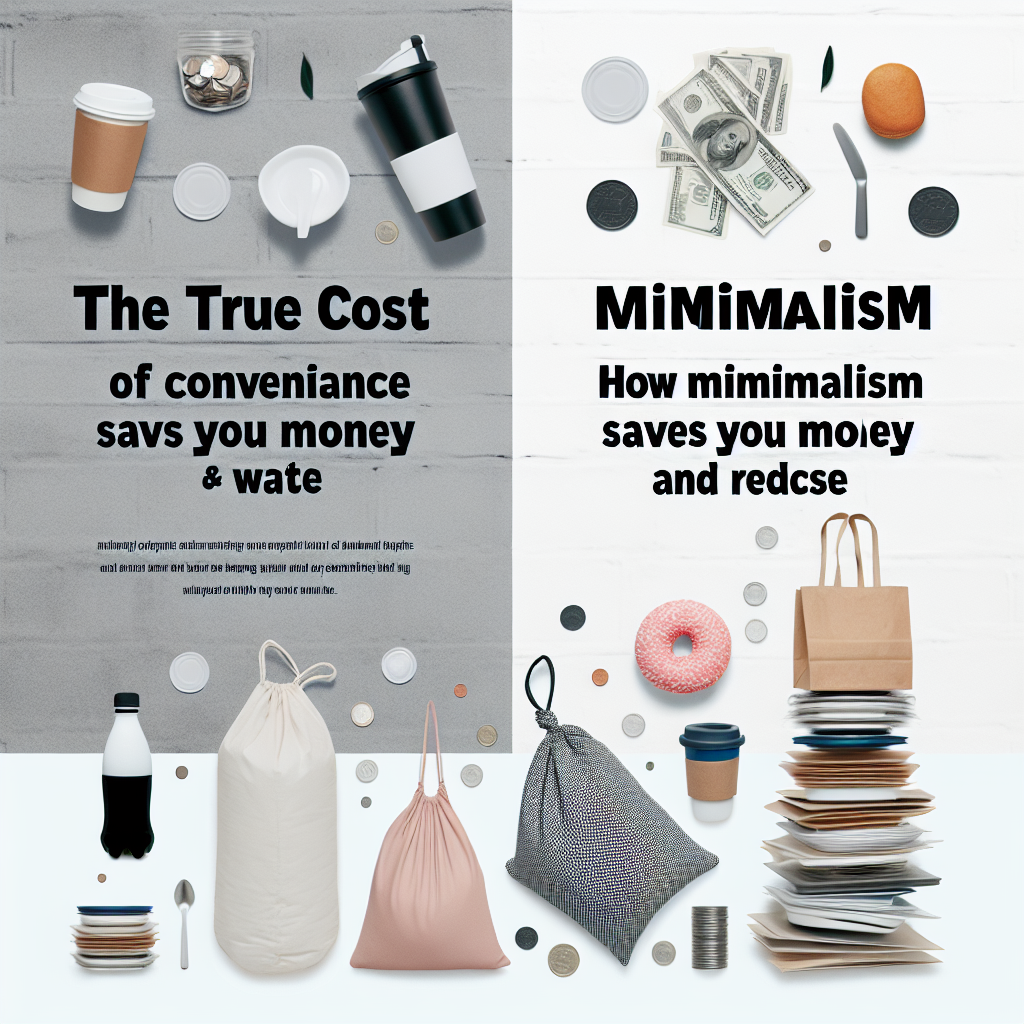The Real Price of Being Convenient: How Minimalism Can Save You Money and Help Our Planet
Introduction
These days, life goes by really fast, and we’re used to everything being super easy and quick. We’ve got fast food spots everywhere, services that give us what we want right away, and gadgets that promise to make life easy. But have you ever thought about how this ‘fast and easy’ life affects your wallet and our planet? Don’t worry! At Frugal Zeitgeist, we’re here to tell you how awesome minimalism can be. It not only saves you money but also helps cut down on waste. Maybe it’s the life change you didn’t know you needed!
Understanding the Convenience Craze
In today’s world, being convenient and fast is the way many people like to live. We’ve got apps that bring food right to your door in no time, and lots of subscription services to keep us entertained. Convenience is everywhere!
But have you noticed how quickly those little costs add up? Here are some convenient thingies that might be making your wallet cry:
- Subscription services: Netflix, Spotify, Disney+… there’s something for everything!
- Fast food and meal deliveries: Goodbye cooking, hello extra delivery fees.
- Disposable products: Paper plates, plastic forks, and all those single-use things.
Even though these seem nice, they can cost a lot. Let’s check out how much they really cost.
The Money Side of Convenience
Oh boy, the money we spend because we want things fast! Convenience usually costs more because:
- Higher pricing for ready-to-use stuff: Pre-packed salads and microwave meals cost more than making your own.
- Buying on impulse thanks to sneaky ads: Ads that say “do it, you deserve it” are hard to resist.
- Long-term money effects from short-term ease: All the small buys become big expenses. Trust us, your credit card feels it!
Think about these examples:
- Daily coffee from shops vs. making it at home: If you buy a $5 coffee every day, it’s $150 a month! Making coffee at home is way cheaper.
- Eating out vs. cooking at home: Ordering out a lot doubles your grocery bill.
- Single-use stuff vs. reusables: Reusable bottles and bags save money over time.
Convenience and the Earth
Besides costing money, convenience creates a lot of waste:
- Raw materials and energy use to make convenience goods.
- Filling up landfills, especially with plastics and throwaway electronics.
- Hurting wildlife, because of trash in the oceans and microplastics.
This all builds a huge carbon footprint, making global warming worse. But wait, before you feel bad, there’s hope: it’s called minimalism!
What is Minimalism?
Minimalism is living with intention, focusing on what’s important, and getting rid of the extra—stuff and stress. It’s like going against convenience stuff and wanting less.
Minimalism means:
- Changing priorities from things to experiences.
- Smart shopping, only getting what you really need.
- Wise spending and saving, leading to financial freedom and helping the planet.
Money Benefits of Minimalism
Minimalism has lots of ways to save money:
- Spending less on things you don’t need, because less stuff means less buying.
- Better financial habits and budgets, since you think more about your spending.
- More chances to save and invest, because living minimally usually means lower costs.
Want to try minimalism? Here’s how:
- Think about needs over wants to avoid shopping on a whim.
- Keep your space simple by decluttering every few months.
- Choose quality over quantity, buying things that last.
Earth Benefits of Minimalism
Minimalism helps the Earth, not just your wallet:
- Less personal waste: Fewer things mean less trash—simple!
- Lower need for mass-produced goods, saving resources.
- Smaller carbon footprints, since minimalists often make eco-friendly choices.
Minimalism promotes smarter resource use, supports green living practices, and shrinks your carbon footprint. You’re not just downsizing your home; you’re making a big impact on our planet!
Real-life Stories
Meet Anna and Ben—a couple who went minimalist and got rid of extra stuff. A few months later, they’re saving hundreds on utility bills, groceries, and personal costs. Plus, their house feels bigger without all the clutter!
Tips from Anna and Ben:
- Start small; be sustainable step by step.
- Prefer experiences over things.
- Join groups of other minimalists for support.
Easy Steps to Start Minimalism
Want to start your minimalist journey? Try these:
- Clear out your living space, one room at a time.
- Cut down on subscriptions, and soon you’ll have extra cash!
- Build eco-friendly habits, like using reusable bags or shopping second-hand.
- Buy thoughtfully; remember, quality is better than quantity.
Minimalism isn’t always easy, but staying patient and committed makes all the difference.
Conclusion
Being convenient might sound good, but it’s important to see how it affects your money and the Earth long-term. Minimalism, however, helps you manage money better and live sustainably, giving benefits to you and the world.
Call to Action
Look at your own life—find places you can save money and cut waste by being less reliant on convenience. Start small: cancel an unused subscription, use a reusable cup, or tidy up your home. As you try out minimalist ideas, you’ll not only save but also help our planet. Join us at Frugal Zeitgeist and let’s work towards a smart, minimalist life and save the green—money and the Earth’s kind too!
